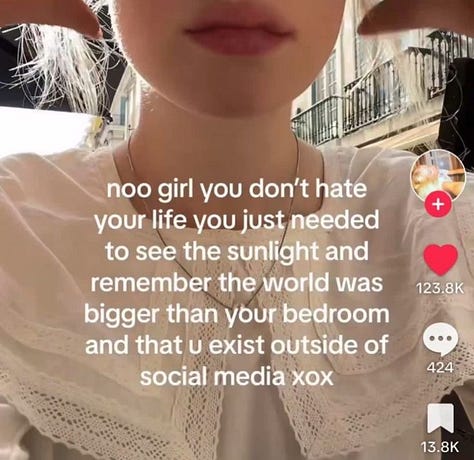

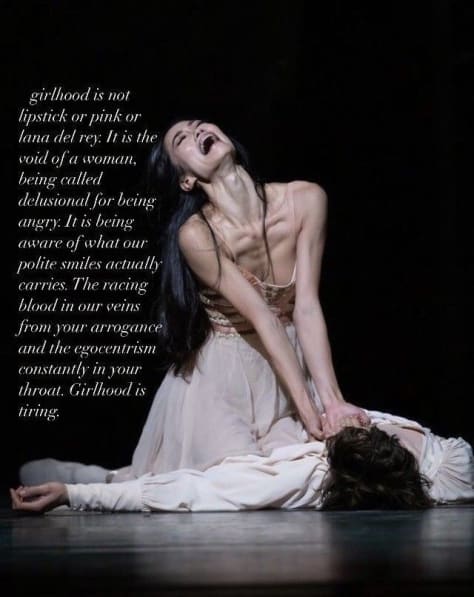
With Brat summer in full swing, Charli xcx has recently grasped the Gen-Z collective attention and ushered us into the season of lime green, hyperpop and effortlessly cool girls. In finding the balance between tasteful self-righteousness and daring introspection, Charli has created an album that simultaneously enables listeners to forget their worries without acting like they don’t exist. Brat is an album, an attitude, that declares, “I am messy. I am complicated. I am scared shitless. And still, I can have fun.”
Even though Brat has resonated with people of all backgrounds and identities, more than anything it has resonated with women. With songs like “Sympathy is a knife” and “Mean girls,” Charli has added her voice to the current conversation dissecting womanhood and the accompanying complexities. “Girl, so confusing,” has especially resonated with women online, with the remix featuring Lorde using music as a platform for the two artists to engage in a candid conversation about competition, friendship, success, and the conflict that arises within female friendship.
On one of my recent listens of Brat (and there have been many), I found myself chewing on the question posed in the chorus of “Girl, so confusing”:
Girl, it's so confusing sometimes to be a girl.
How do you feel being a girl?
Man, I don’t know I’m just a girl.
These lyrics, and the rest of Brat, speak simply and candidly, leaving me with a lofty question: How do I feel about being a girl? This is a question that haunts me as I try to find moderation between embracing all that comes with femininity and rejecting the ways that the patriarchy and misogyny inform and infiltrate it. After deleting my social media accounts during the pandemic, I’ve spent the past year reentering the virtual world and reacquainting myself with the internet and the conversations being held there. In this reintroduction, I’ve seen that this personal reckoning of womanhood of mine isn’t all that personal. Instagram, Pinterest, Twitter, TikTok. They’re all filled with women trying to find and live in their identities online.
My feeds are littered with posts and comments discussing and dissecting womanhood, yet it never seems to be referred to as such. Womanhood, it seems, is out, while girlhood has never been so in. The conversations I see are all about being a girl, usually just a girl. Women speak about the perils of being soft, the perils of being gentle, of being weak. There are posts littered with bows and angels, comparing girlhood to martyrdom, to innocence, to holiness.
I am no stranger to claiming that “I’m just a girl” when things get hard or, more accurately, when I don’t feel like dealing with the hard things straight on. The moments of letting myself be “just a girl“ feel like taking a breath. It feels like letting go of the reins for just a moment and finding peace and simplicity in an existence that is anything but peaceful and simple. I can’t blame or chastise my fellow women for leaning into this self-infantilization, especially when I’ve related and reshared the sentiments in question, but the trends and messages being pushed out by these sorts of posts have started to make me feel icky. Even though I instinctually resonate with this way of reckoning with womanhood, I’ve lately been questioning why we are so quick and eager to create an image of ourselves that sinks into weakness, subservience, and pain.

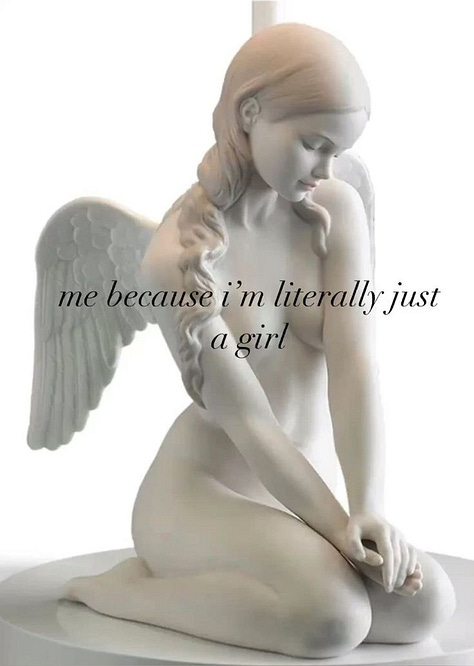

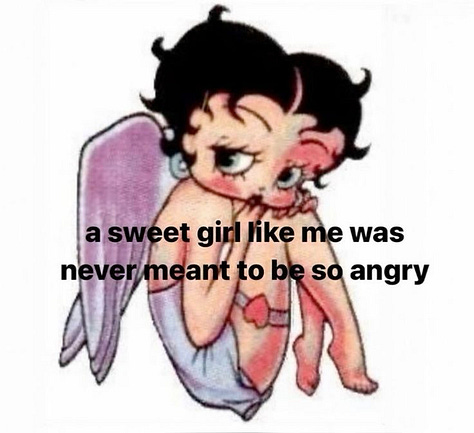
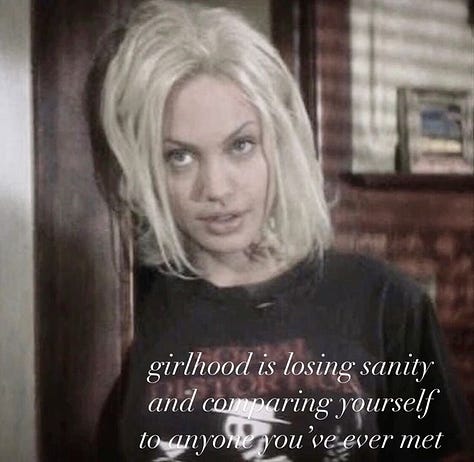

I can’t help but wonder if we women of the 2020s, left with the crumbs of corporatized female empowerment that apparently solved misogyny, are trying to get ahead of our oppressors by drawing, forcing, beauty out of our oppression. When we proclaim that we are “just a girl,” we detach from our power before men can take it from us. We tell the patriarchy that we are one step ahead of it, that they can take what they want since we are too kind, too sweet, and too tired to fight for it.
We are not smart and insightful, because it’s easier to be sweet and angelic. We are not strong and firey, because it is easier to be tired and exhausted. In the spaces begging to be filled with anger and action, we shove weakness and passivity, trying to force it to fit even when it doesn’t. God forbid that we, as women, respond to our oppression with outrage. As we grow up, women sow the fear of overreaction within ourselves, until no reaction feels like the right one. When we talk about things candidly, we are too serious. When we are angry about our oppression, we are overdramatic. When we use our shared experience as a radical form of connection, we are being performative. How, I ask again and again, are we supposed to be?
In my efforts to analyze and unpack all of these trends, I’m also stuck wondering if women will ever be allowed to just be. Can women create self-deprecating trends and inside jokes without carrying the weight of our gender on our shoulders? Or do we have a responsibility to look at these things with a critical eye, sacrificing the fun of right now for the future of female power? It’s not like the things being talked about in these posts are wrong; Actually, far from it. A lot of the posts online (and many that I’ve included throughout this post) put the female experience into words very accurately. Of course, we want to be pretty. Of course, we feel crazy. Of course, we are uncomfortable feeling angry. The current narratives online are necessary and we need to be talking about the issues at hand, but the way we are discussing them feels counterproductive.
The “girlification” of womanhood is problematic for many reasons, but more than anything, the problem lies in where it places responsibility for these issues. Instead of blaming the patriarchy or misogyny or capitalism or imperialism or Western culture, we blame girlhood, and in blaming girlhood, we blame ourselves. These sentiments all center around women being the problem. It’s our crazy thoughts. It’s our intense emotions. It’s our weakness. We are made to internalize our oppression. We are meant to take our observations and experiences and make them our problem, either blaming ourselves or surrendering to the misogynistic powers at hand. We are taking a passive role, instead of an active role, in our own oppression. That’s the problem with being “just a girl.” It waves the white flag. It tip-toes around real issues. It makes our suffering palatable, digestible, trivial.
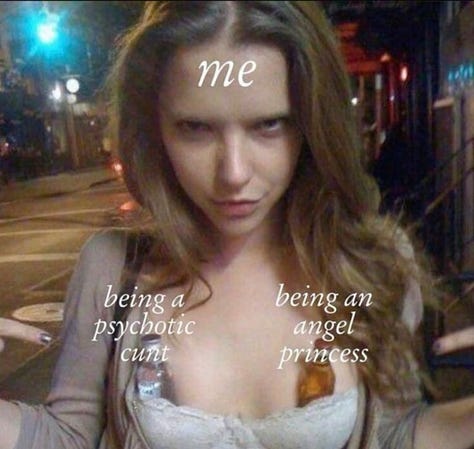
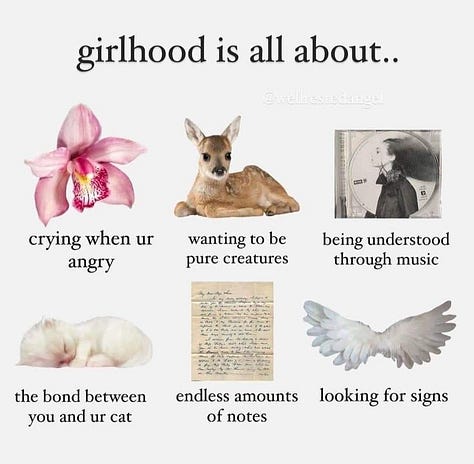
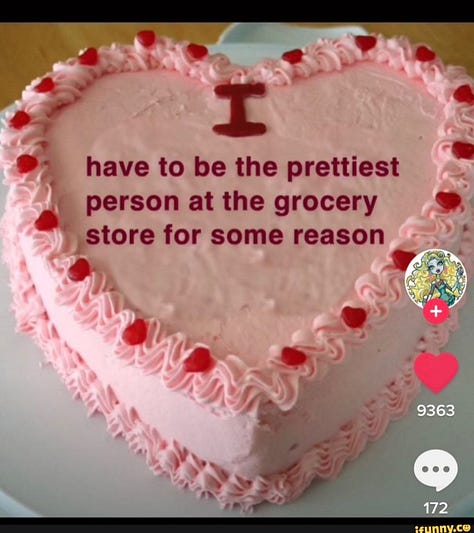
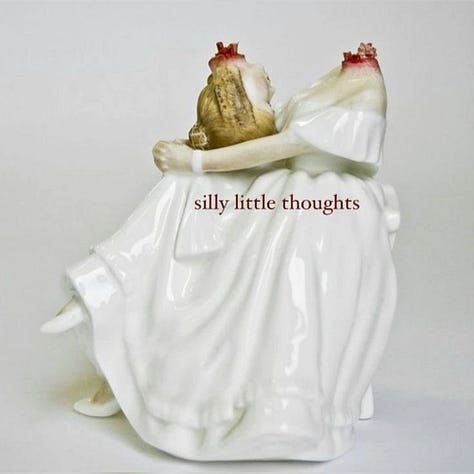
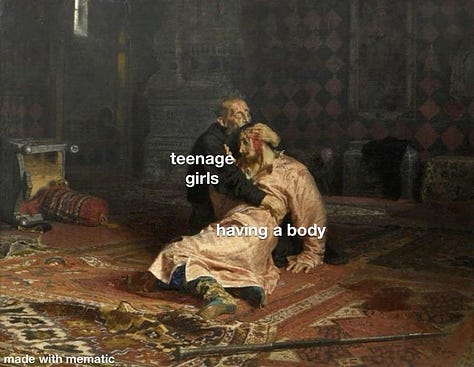
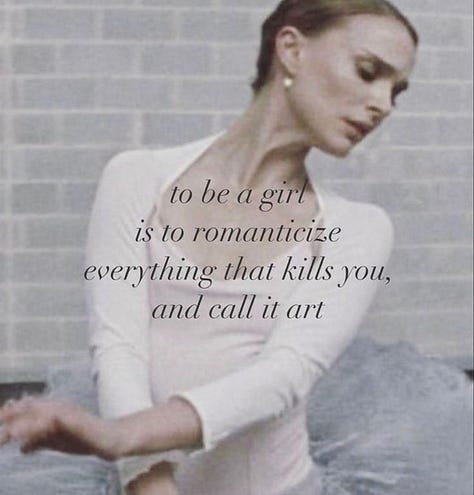
The fear of directly engaging with these issues is so large and looming that we pacify ourselves instead. We agree and reinforce the ideas and then close the conversation. Instead of the discussion being a “yes, and,” it is a simple “yes.” Because of the passivity that has been sewn into womanhood over time, these narratives are an act of feminism to many women. They use self-deprecation and awareness to reclaim their power. It’s almost Dostoyesky-like of us to view suffering as such a foundational aspect of our existence.
It’s interesting how we choose to embrace our suffering as an integral part of womanhood, even though this suffering is not existential at all. The suffering being talked about by women online is societally made. It is not made by just being a girl, but by the way society treats girls, and when we talk like this, we reinforce the idea that the problem is simply being a woman. We weaken ourselves, our defenses, and our arguments in order to make it feel better, less bleak. So many of these memes have deep truths hidden below the surface, so why do we stay above the water?
Honestly, it’s infuriating to me how close we are to finding collective power through our suffering but instead of using our intelligence to end our suffering, we use it to enable it. Of course, I understand why. The suffering feels endless, and the suffering may be endless. But why do women always seem to put their hands up in sacrifice to the suffering? The problem isn’t that women are incapable of engaging in these conversations, it’s actually the opposite. To be a woman is to be clearly, painfully aware of all you are and all you cannot be. Every woman I know can tell you how the patriarchy impacts their life and the way it has manifested in their personality and lifestyle, yet we stay stagnant.
The often problematic, often prolific philosopher Simone de Beauvoir wrote about this issue. In “The Second Sex,” she asserts that women struggle to effectively organize and create change because our existence is so inherently tied to men, and I can’t help but agree with her. Female culture and thought seems to exist as a string tangled within the knot of masculinity. How do we untether ourselves from their expectations, from their world, amidst the mess they have made? How do we remove ourselves from the chaos instead of cleaning it up?

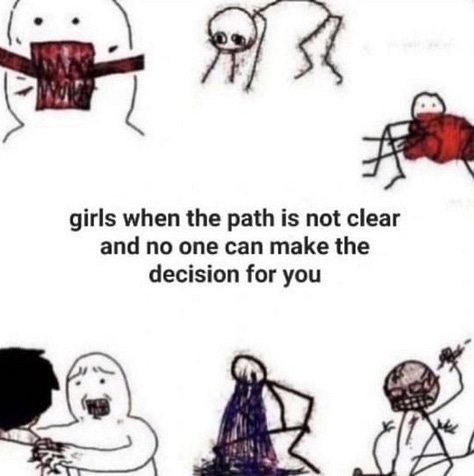

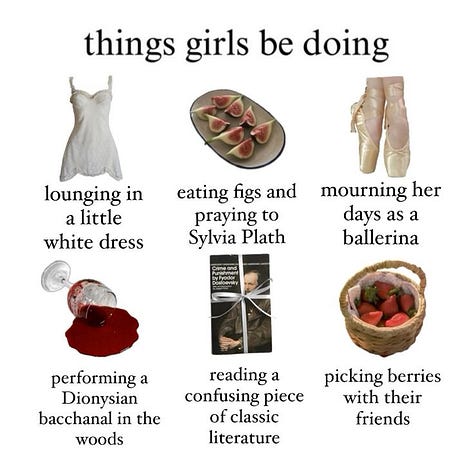


I don’t have the answers I wish I had, but I do think we have to start with taking ourselves seriously. We have to reject the urge to simplify ourselves, especially since womanhood is so far from simple. Sometimes I find myself wondering if we hear ourselves when we repost these posts that saddle us into such a victim role. Are you just a girl? Are you just someone who everyday finds beauty in the wretched? Are you just a person who chooses to embrace softness in a hardened, unforgiving culture? Are you just a part of a group that has been oppressed and forced into rigid gender roles and structures since the beginning of time?
I don’t think that women have an ethical responsibility to reject their softness and gentleness. In fact, I think if anything we have a responsibility to embrace it. I don’t think that, to live in our strength, we must reject the parts of womanhood that are complicated and passive and true. I do think, however, that we need to get comfortable taking ourselves more seriously. It’s not about erasing these sentiments and acting like womanhood isn’t crushing, but about using these ideas as a jumping-off point that then enables us to critically analyze our place in the world. We know what’s wrong. We know how we feel. Now, it’s time for us to do something about it.
I still don’t think I can answer Charli’s question. I still don’t know how I feel being a girl. I do, however, know what girlhood womanhood has both given to and taken from me. I know that girlhood womanhood is complex and maddening and beautiful and intense. I know that, by design, there is no “right” way to exist in a patriarchal society as a girl.
If I am just a girl, it’s because that is all I have ever been allowed to be. If I am just a girl, I am also a woman and a friend and a protector and an intellectual. If I am just a girl, I will burn this place to the ground. If I am just a girl, I am so much more, and in being a girl, I am infinite. And in being a girl, so are you.
With love, with solidarity, in power,
Alex

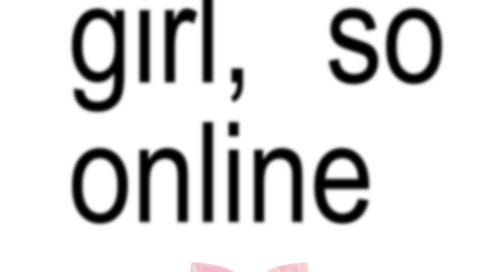


A great read, thank you for sharing. Sometimes I think the infantilization is a good thing, it signals that their world is safe enough that they can afford to indulge in messy, unaccountable, immature behavior (and package it as an aesthetic and then publish online) it means that someone is holding down the more material aspects of safety, shelter, security etc.
There’s no urgency to mature and be a woman, which can be see as a good thing, it’s endearing when girls in the developed western world lean into these vulnerable, delicate archetypes, it’s a luxury really, but also it’s a testimony to the state of the world which is overwhelmingly good.
This is super interesting to me because I basically grew out from being essentially a boy with female form into a woman. I don’t think I ever properly girled. When it was time to girl I wasn’t really getting how to, so boying seemed easier. Boys have way more clear-cut pastimes - fishing, stealing cherries from the neighbors’ tree via garage roof, setting shit on fire. Girls were, like, talking. And I never knew what they were talking about. But once it came to womaning, that suddenly went way better! I think the answer is getting older. You suddenly realize there are no rules and fuck anyone who tries to tell you otherwise.
The perpetual girl thing reminds me a lot of Japanese young women in particular, who have a very specific style that often includes plushies and high school uniform vibe clothes and a general sense of cutification and seeming much younger than they are, but, like, in an ‘owning it’ sort of way. I’m sure there’s some interesting writing out there on the philosophy of it.